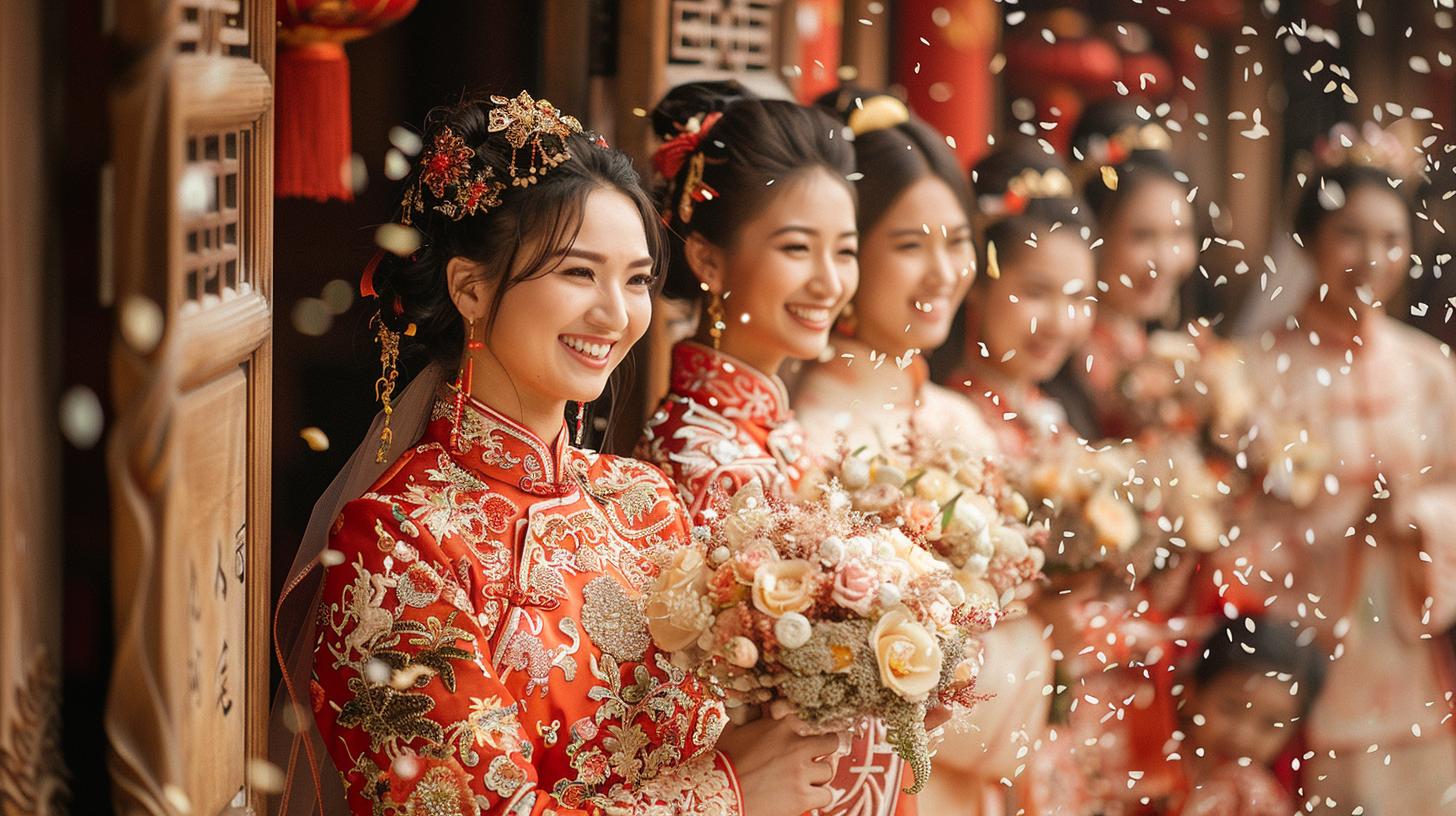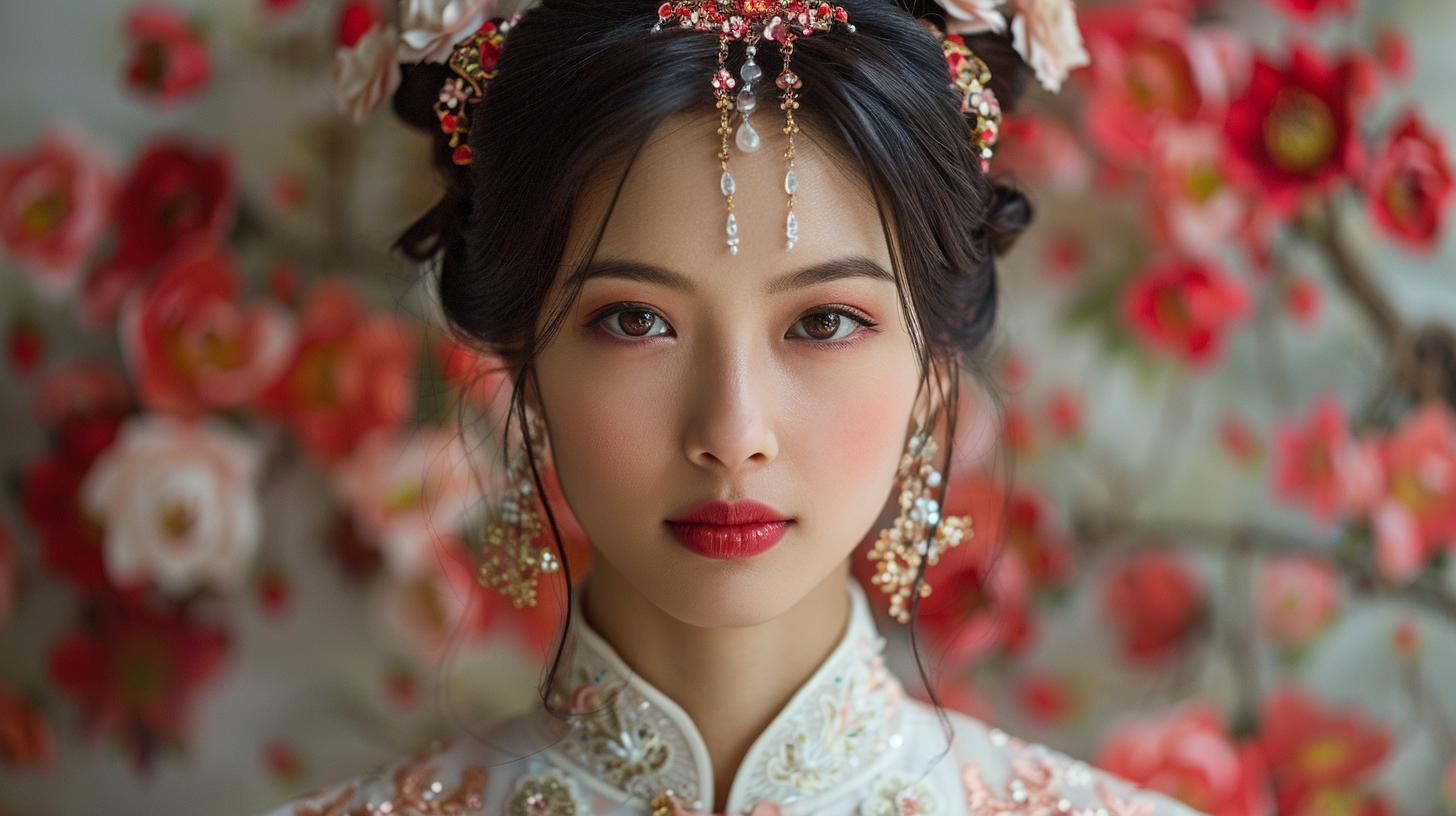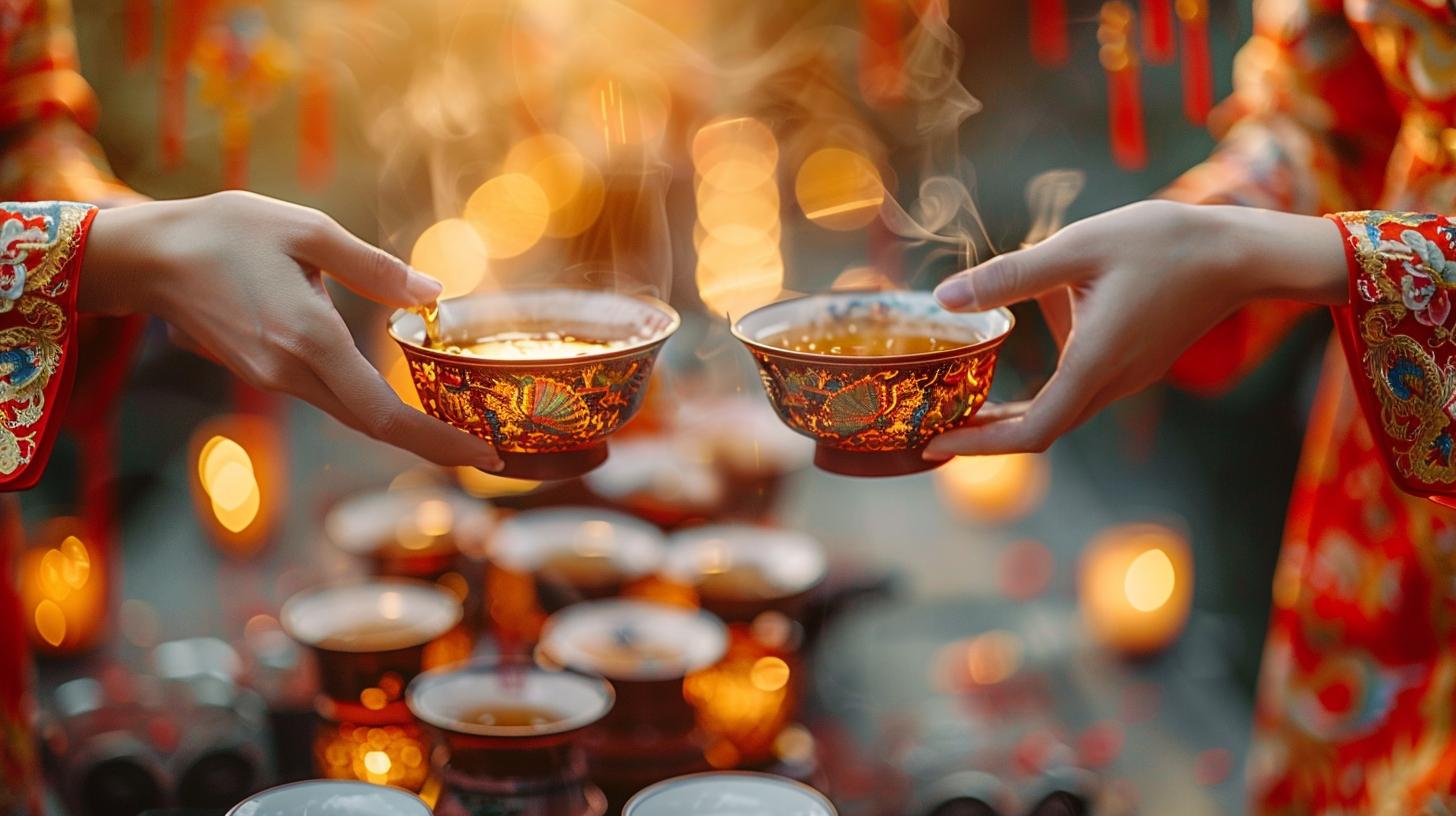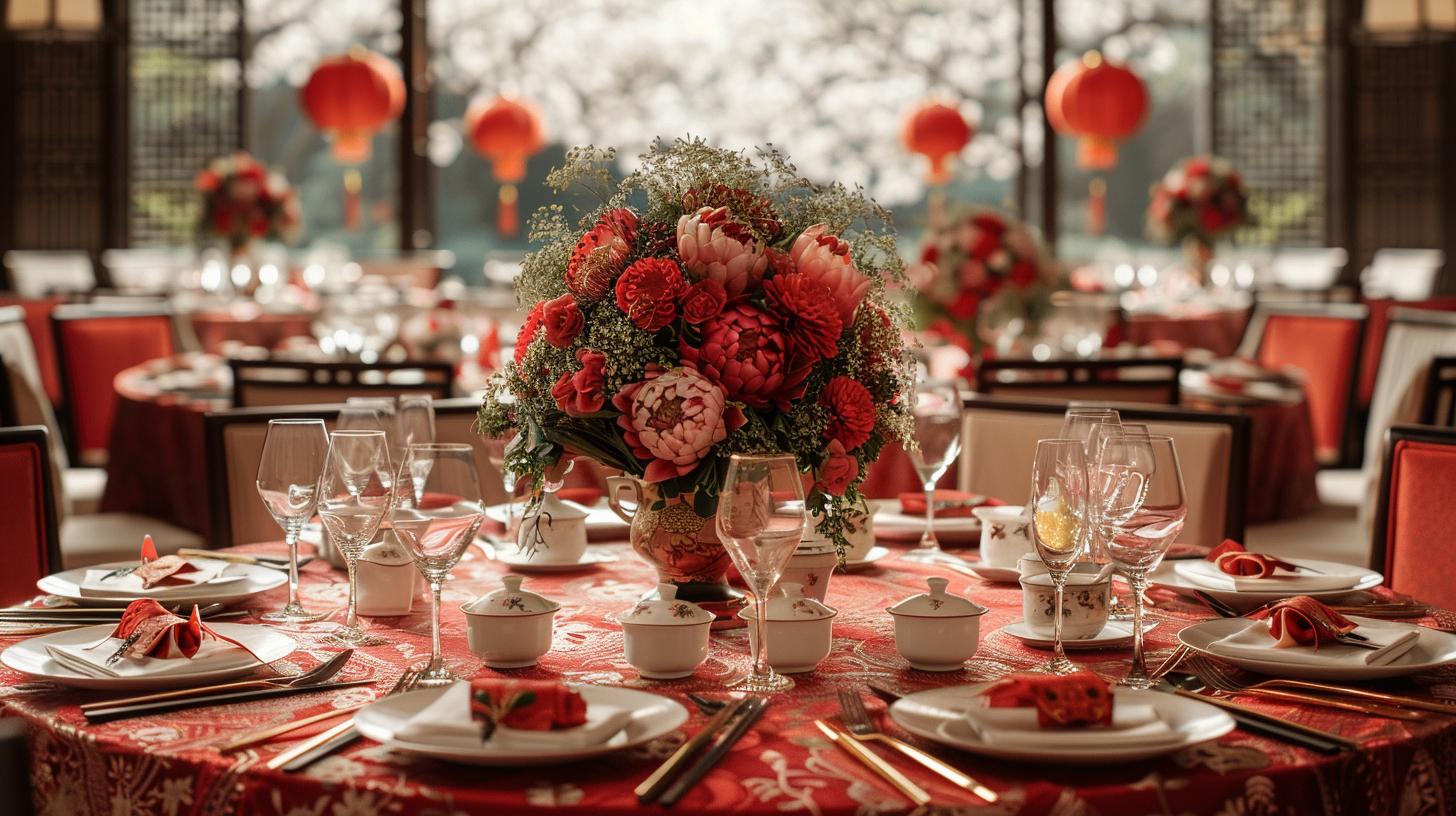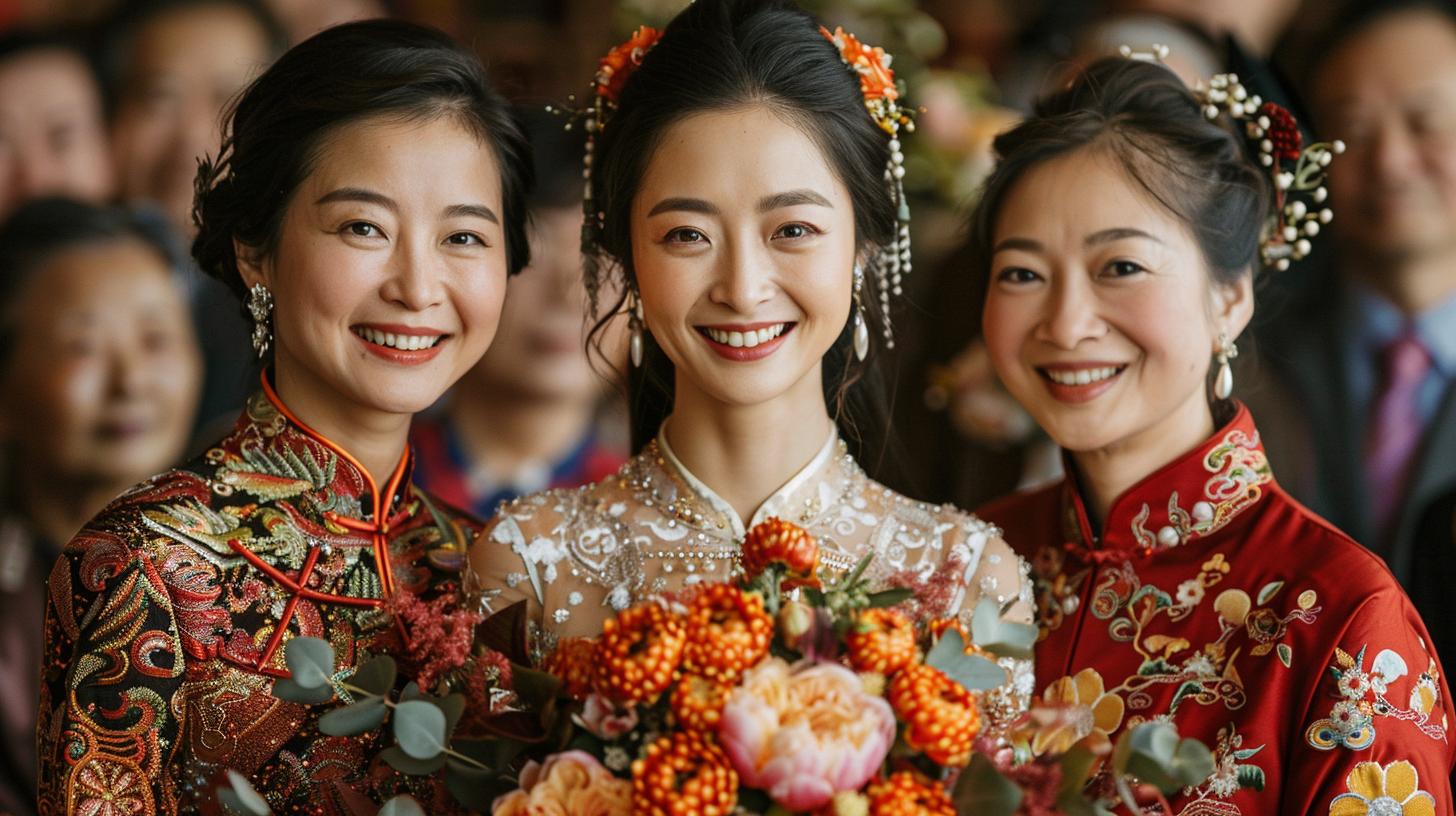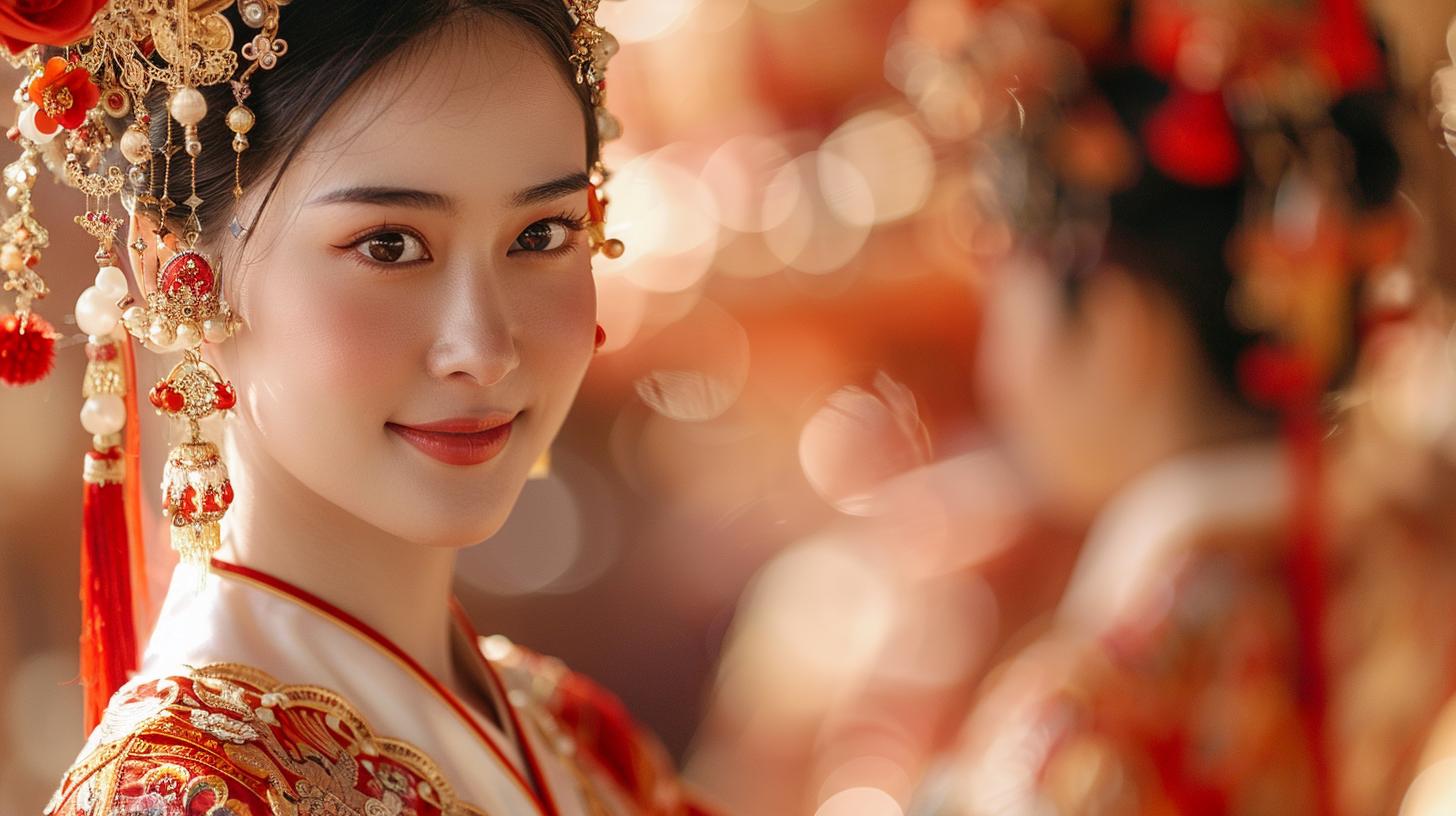What Are Chinese Wedding Traditions: A Complete Guide
Chinese wedding traditions are steeped in rich symbolism and centuries-old customs. From pre-wedding ceremonies like traditional engagement rituals and the symbolic tea ceremony, to post-wedding customs including elaborate banquets and special activities, these rituals are deeply meaningful.
On the wedding day, dressing the bride and groom in traditional attire and incorporating symbolism through colors and objects play a significant role. Modern adaptations blend Western influences with Chinese traditions, ensuring a unique and personalized celebration.
Maintaining these customs preserves cultural heritage and emphasizes the importance of passing down traditions for generations to come.
Pre-Wedding Ceremonies
Traditional Chinese Engagement Customs
In Chinese culture, engagement is a significant step towards marriage and involves various customs and traditions. These customs are rooted in ancient beliefs and symbolize the coming together of two families.
The Importance of the Tea Ceremony
The tea ceremony is a pivotal pre-wedding ritual that holds deep cultural and symbolic significance in Chinese weddings. It is a way for the bride and groom to show respect and gratitude to their parents and elders.
The Tea Ceremony Process
During the tea ceremony, the bride and groom serve tea to their parents and receive blessings in return. This ritual symbolizes the couple’s willingness to uphold familial values and honor their ancestors.
Symbolism of Tea Ceremony
The act of serving tea symbolizes respect, gratitude, and unity within the family. It signifies the couple’s commitment to each other and their families, as well as their readiness to embark on a new chapter together.
Hair Combing Rituals
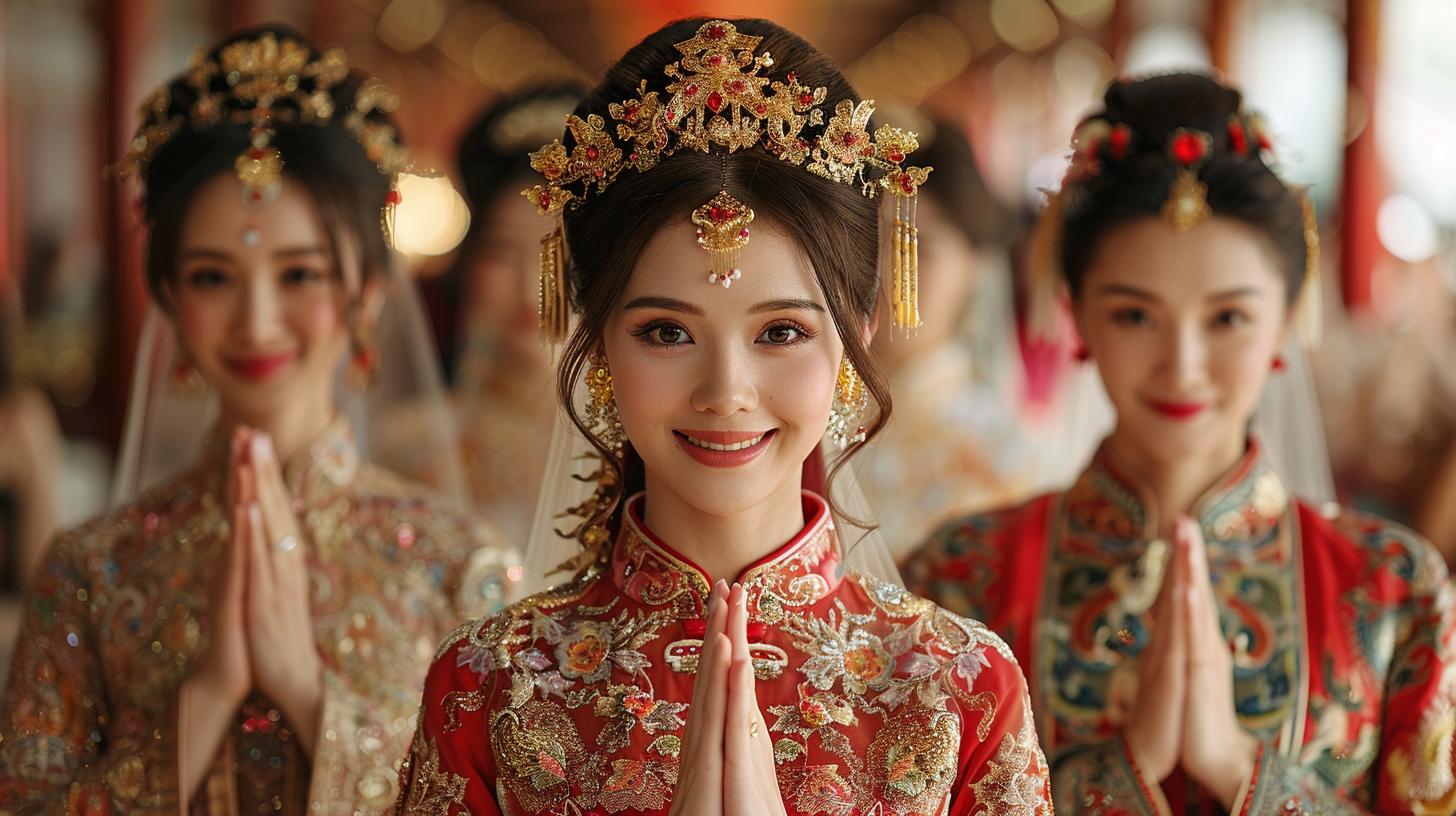
Hair combing rituals are another traditional pre-wedding custom in Chinese culture. The ceremony involves the bride having her hair combed by her mother, symbolizing the transition from childhood to adulthood.
Hair Combing Ceremony Details
During the hair combing ceremony, the bride’s mother carefully combs her daughter’s hair while offering words of wisdom and blessings for a happy and prosperous marriage.
This ritual is a touching moment of bonding between mother and daughter.
Wedding Day Traditions
Chinese weddings are steeped in tradition and symbolism, with the wedding day being a culmination of many significant customs and rituals. From the attire of the bride and groom to the symbolic meanings behind colors and objects, every aspect of the wedding day is meaningful and culturally rich.
Dressing the Bride and Groom
On the wedding day, the bride and groom don traditional attire that reflects their cultural heritage and personal style. The bride typically wears a stunning red qipao or cheongsam, symbolizing luck and happiness, while the groom dons a traditional black silk coat and pants.
Traditional Attire for the Bride
The bride’s attire is often adorned with intricate embroidery and gold accents, symbolizing prosperity and wealth. A red veil may also be worn to ward off evil spirits and bring good luck to the couple.
Groom’s Attire for the Big Day
The groom’s attire is subtle yet elegant, usually featuring subtle details that hold cultural significance. The groom may also wear a red silk sash or tie, symbolizing the union of the couple and their families.
The Wedding Ceremony
The wedding ceremony is a sacred and elaborate affair, filled with traditional customs and rituals that have been passed down through generations. From the exchange of vows to the offering of gifts, each element of the ceremony holds deep symbolic meaning.
Customs and Rituals During the Ceremony
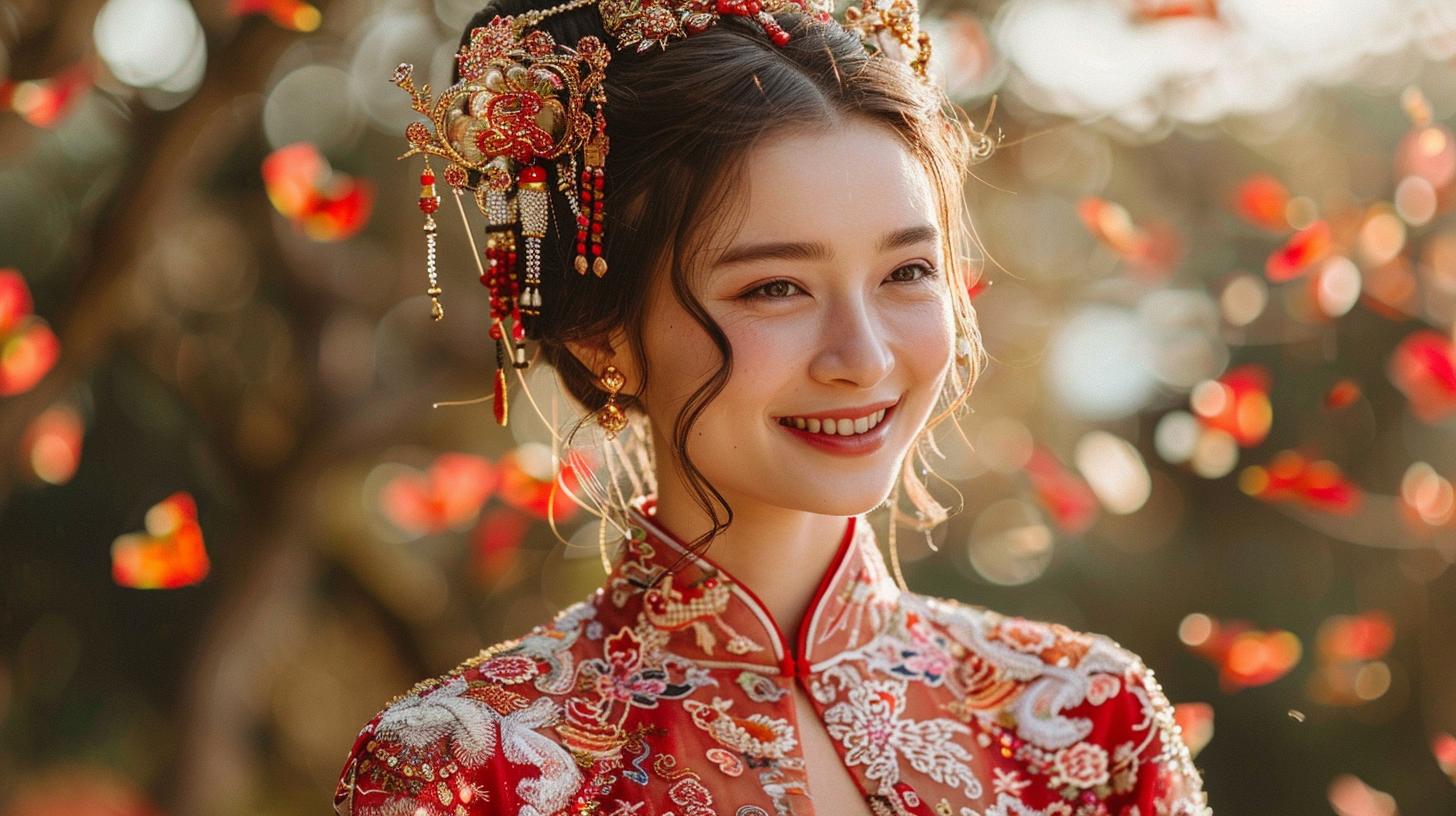
During the ceremony, the bride and groom may perform rituals such as the lighting of a unity candle or the sharing of a cup of wine, symbolizing their commitment to each other and their future together.
Family members and elders may also offer blessings and well wishes to the couple.
Symbolism of Colors and Objects
Colors and objects play a significant role in Chinese weddings, with each hue and item representing different aspects of love, luck, and prosperity. From the vibrant reds and golds to the symbolic use of dragons and phoenixes, every color and object carries a profound meaning.
Meaning of Red and Gold in Chinese Weddings
Red is the predominant color in Chinese weddings, symbolizing joy, luck, and prosperity. Gold accents are often incorporated into the color scheme as well, representing wealth and abundance. The combination of red and gold is believed to bring good fortune to the newlyweds.
Dragon and Phoenix Symbolism
The dragon and phoenix are iconic symbols in Chinese culture, each representing different qualities and virtues. The dragon symbolizes power, strength, and good fortune, while the phoenix symbolizes beauty, grace, and prosperity.
Together, they symbolize the harmony and balance of the universe.
Post-Wedding Customs
After the excitement of the wedding day passes, there are still important customs and traditions to be observed in the days following the ceremony. Post-wedding customs in Chinese tradition often include a special banquet and specific activities to honor the newlywed couple.
Celebrating with a Banquet
- Traditionally, a grand Chinese wedding banquet is held to celebrate the union of the bride and groom.
- Guests are treated to a lavish feast featuring symbolic dishes that represent prosperity, unity, and happiness.
Three Days After the Wedding
- Three days after the wedding, the bride returns to her family home to visit her parents.
- This visit symbolizes the bride’s gratitude and respect towards her parents for raising her.
Modern Adaptations and Trends
Modern Chinese weddings are seeing a blend of traditional customs with contemporary influences, creating a unique and personalized celebration that reflects the couple’s preferences and style.
Incorporating Western Elements
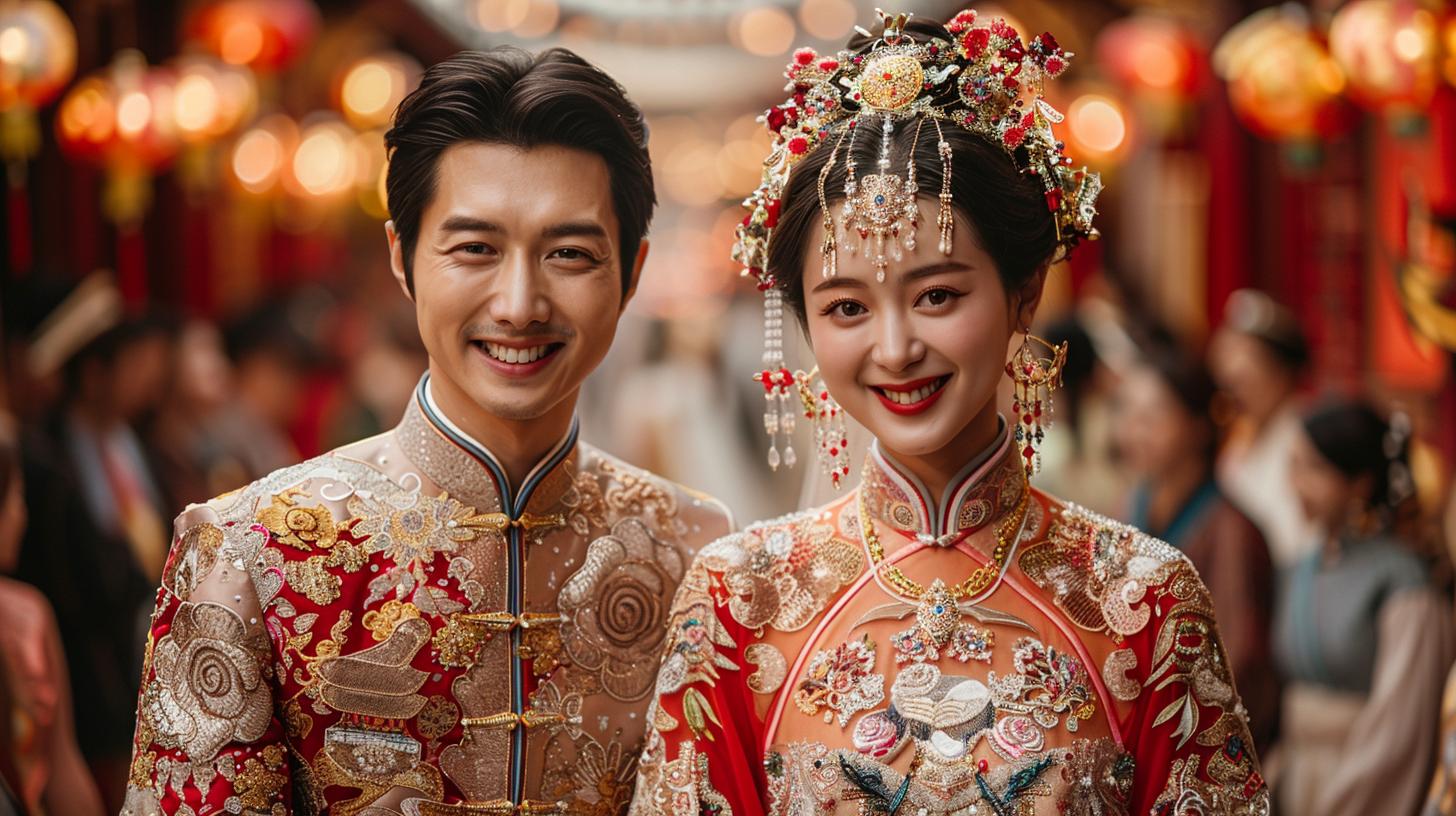
Many Chinese couples today are incorporating Western elements into their wedding ceremonies, such as exchanging rings, walking down the aisle, or having a first dance. These additions add a modern touch to the traditional festivities and create a fusion of Eastern and Western cultures.
Personalizing Your Chinese Wedding
When planning a Chinese wedding, couples have the freedom to personalize various aspects of the ceremony to make it truly their own. From choosing a unique venue to customizing the decor and menu, there are endless possibilities to create a memorable and meaningful event.
Ideas for a Unique Celebration
- Consider incorporating elements of your love story into the decor or wedding favors.
- Personalize the traditional tea ceremony by using special tea sets or serving your favorite blends.
- Create a signature cocktail that reflects your cultural backgrounds or shared interests.
- Engage guests with interactive activities or games that bring a fun and modern twist to the celebration.
Maintaining Chinese Wedding Traditions
Preserving Chinese wedding traditions is essential for upholding cultural practices and ensuring that the rich heritage is passed down to future generations.
These customs have been cherished for centuries and hold significant meaning in Chinese culture.
Keeping Cultural Practices Alive
- Chinese wedding traditions are deeply rooted in history and symbolism.
- By maintaining these practices, the cultural identity of the Chinese community is preserved.
- Traditional customs bring families together and create lasting memories.
Importance of Passing Down Traditions
- Teaching younger generations about Chinese wedding traditions instills a sense of pride and heritage.
- By passing down these customs, families honor their ancestors and ancestors’ customs.
- Participating in traditional practices fosters a sense of belonging and unity within the community.
.

